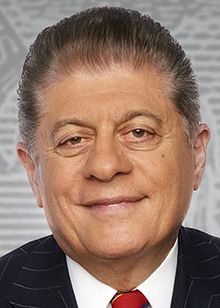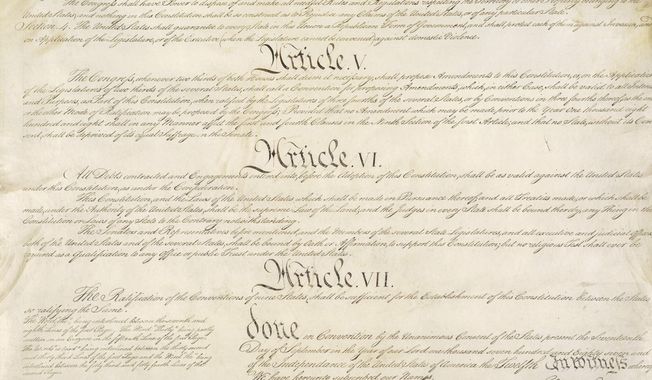Andrew P. Napolitano
Articles by Andrew P. Napolitano
More spying and lying from the Trump administration
The Trump administration has quietly moved to extend and make permanent the government's authority to spy on all persons in America. Published August 21, 2019
Second Amendment liberties: The dangerous urge to do something
When tragedy strikes, as it did in two mass killings earlier this month, there is always the urge to pressure the government to do something. Published August 14, 2019
Supreme Court: Right to bear arms protected by highest category of liberty recognized by law
Last weekend's mass murders in El Paso, Texas, and Dayton, Ohio, have produced a flood of words about everything from gun control to mental illness to white nationalism. Most of those words have addressed the right to keep and bear arms as if it were a gift from the government. It isn't. Published August 7, 2019
Why hatred must be rejected loudly in all its forms
The private Trump I have known is funny, charming and embracing. That is not the public Trump of today. Published July 24, 2019
The limits of free speech
During the past week, President Donald Trump excited two bitter public controversies by sending and publishing two highly inappropriate and offensively incendiary tweets. Published July 17, 2019
The Constitution, the census and citizenship
Late last month, the U.S. Supreme Court ruled on a challenge to a question that the Commerce Department announced it would add to the 2020 census. The census itself has been mandated by the U.S. Constitution to be taken every 10 years so that representation in the House of Representatives could be fairly apportioned to reflect population changes. Published July 10, 2019
Jeffersonian ideals of personal natural rights and governmental legitimacy have become myths
The Declaration of Independence — released on July 4, 1776 — was Thomas Jefferson's masterpiece. Jefferson himself wrote much about it in essays and letters during the 50 years that followed. Published July 3, 2019
Trump, health care transparency is moot because government has no say in health care
Many of my media colleagues have been lauding President Donald Trump for signing an executive order earlier this week directing the federal Department of Health and Human Services to require health care providers to inform patients in advance of the true costs of medications and services. Published June 26, 2019
Can government punish twice for the same crime?
Last week, this column discussed the unconstitutional efforts of federal prosecutors in Chicago to punish an American citizen for crimes that had not yet been committed. This week, I address the wish of federal prosecutors in Alabama to charge and to punish a man for a crime for which he had already been convicted and punished. Published June 19, 2019
Trashing the Constitution again
While the eyes of the political and media classes were on President Donald Trump as he commemorated the 75th anniversary of D-Day in the United Kingdom and in France last week, and then as we all watched for progress in the tariff war Mr. Trump started with Mexico, the Department of Justice was quietly trying to persuade a federal judge in Chicago to abandon first principles with respect to citizenship and sentencing. Published June 12, 2019
Mueller stirs the pot
Last week, special counsel Robert Mueller — who had been appointed by the Department of Justice two years earlier to investigate the nature and extent of Russian attempts to influence the outcome of the 2016 presidential election and to determine, if those attempts did occur, whether the Russians had any willing American collaborators in the Trump campaign — came to the cameras and announced his resignation. Published June 5, 2019
Julian Assange indictment runs counter to the Supreme Court decision on Daniel Ellsberg
When James Madison agreed be the scrivener at the Constitutional Convention during the summer of 1787, he could not have known that just three years later he'd be the chair of the House of Representatives committee whose task it was to draft the Bill of Rights. Published May 29, 2019
To impeach or not to impeach
The revelation last weekend by Michigan Republican Congressman Justin Amash that he believes the Mueller report accuses President Donald Trump of impeachable offenses has ignited firestorms in both major political parties on Capitol Hill. Mr. Amash's argument is simple and essentially unassailable, though his fellow congressional Republicans don't want to hear it and Democrats don't know what to do with it. Published May 22, 2019
For many years, the fear of a president as king was unthinkable, but now it’s not
There was a time in American history — nearly all of it up to the presidency of Woodrow Wilson — when the federal government followed basic constitutional norms. With some unique and discrete exceptions, like the Civil War, Congress wrote the laws, the president enforced them, whether he agreed with them or not, and the judiciary interpreted them and assessed their compatibility to the U.S. Constitution. This is the separation of powers. Published May 15, 2019
Did the attorney general deceive Congress?
William Barr, the attorney general of the United States, now faces a likely contempt citation for failing to comply with a congressional subpoena and for misleading Congress. Published May 8, 2019
Can William Barr defend presidential obstruction?
One should expect fireworks this week as Attorney General William Barr testifies before the Judiciary Committees of both the House and the Senate about the investigation and the report of special counsel Robert Mueller regarding Russian interference in the 2016 American presidential election. By now, most folks know that the interference was substantial but don't seem to care much. Published May 1, 2019
Did Donald Trump obstruct justice?
When the Department of Justice designated Robert Mueller as special counsel to take over the FBI investigation of the Trump campaign in May 2017, Mr. Mueller's initial task was to determine if there had been a conspiracy — an illegal agreement — between the campaign and any Russians to receive anything of value. Published April 24, 2019
The Resurrection of Jesus Christ is the linchpin of human existence
When America was in its infancy and struggling to find a culture and frustrated at governance from Great Britain, the word most frequently uttered in pamphlets and editorials and sermons was not "safety" or "taxes" or "peace"; it was "freedom." And two intolerable acts of Parliament assaulting freedom broke the bonds with the mother country irreparably, precipitating the Revolution. Published April 17, 2019
If Robert Mueller found no evidence of conspiracy and obstruction, William Barr would have said so
When Attorney General William Barr released his four-page assessment of Special Counsel Robert Mueller's 400-page report, I was disappointed at many of my colleagues who immediately jumped on board the "no collusion" and "no obstruction" and "presidential exoneration" bandwagons. Published April 10, 2019
Is the Affordable Care Act unconstitutional?
Here we go again. The legal battle over the constitutionality of the Affordable Care Act -- Obamacare -- will soon be back in court due to the largely unexpected consequences of a series of recent events. Published April 3, 2019






















